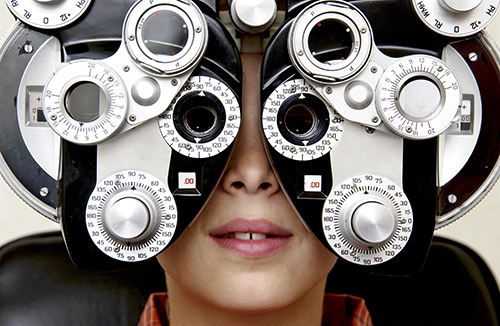 Routine eye exams are very important to detect vision problems, eye disease and general health problems even before you are aware a problem exists.
Routine eye exams are very important to detect vision problems, eye disease and general health problems even before you are aware a problem exists.
If any of the following risk factors affect you, check with Dr. Jovkar to see how often you should have a complete eye exam:
- History of eye injury
- Diabetes
- Family history of eye problems
- African American over age 40
Protecting your eyes from accidents and early detection and treatment of eye problems are the best ways to keep your healthy vision throughout life. If you or your family are at risk for eye disease or experience any eye problems, visit Dr. Jovkar promptly.
Your vision is precious. Make an appointment for an eye exam as soon as you or anyone in your family notices any of the following symptoms:
- Flashes or floaters
- Double vision
- Halos or fuzzy rings around light
- Extreme sensitivity to light
- Redness in the white parts of the eyes
- Excessive itching, burning of eyes
- Sties or other eye inflammations
- Intense pain
- Blurred or hazy vision
- Increased secretions from the eyes
- Inexplicable dizziness
Any of the above symptoms may be due to an underlying condition which can have serious consequences if not treated. Please note for how long, how severe, and in what circumstances the symptoms occur. Please mention these symptoms during your office visits. If any of the above symptoms occur between visits, please call and make an appointment as soon as possible.
How do I prepare for an eye exam?
You don’t need to do anything special before your eye exam. If you wear glasses or contact lenses, be sure to take them with you. Be prepared to answer questions about your vision and health history. Your eye doctor will want to know if you are having any vision problems. Your job has a big effect on your vision, so your doctor will want to know if you do a lot of computer work or drive a lot, for example. The doctor will also want to know if you have any general health problems and what medicines you are taking. Make a list of questions you have for the doctor and take the list with you to the exam.
What happens during an eye exam?
Your eye doctor will ask you if you are having any problems with your eyes. If you already wear glasses or contact lenses, your doctor will ask when you wear them, how long you wear them, and, for contact lenses, what solutions you use to clean them. Next, the doctor will check to see if you are near-sighted, far-sighted, have astigmatism, or need reading glasses.
You will read an eye chart to test your vision.
You will then look through a special instrument while the doctor places lenses in front of your eyes to determine your prescription for glasses or contact lenses. The doctor will also use this instrument to test your reading vision, focusing power, and how well your eyes are working together.
Your eye doctor may measure the shape of your eye, especially if you wear contact lenses.
Next your doctor will check your eye health. The doctor uses a special type of microscope to carefully check the front parts of the eye. Problems like cataracts or pink eye can be seen through the microscope. The doctor will measure the amount of fluid pressure in your eyes to test for glaucoma. Your eye doctor may use special eye drops to dilate your pupils. This opens up the pupils so that the doctor can see your retina and optic nerve at the back of your eye. The doctor checks for serious problems like retinal detachment and macular degeneration. Symptoms of some health problems such as diabetes and high blood pressure can also be seen in the eyes. Finally, your eye doctor will prescribe glasses or contact lenses if you need them. If any eye health problems are found, your doctor will prescribe medication or more tests.
What happens after the eye exam?
If the doctor used eye drops to dilate your pupils, they can take several hours to wear off, so your near vision may be a little blurry and you may be sensitive to light for a few hours. If your doctor prescribed glasses for you, you can select frames and order your new glasses. If you are getting contact lenses, you may need to see your doctor again to have them properly fitted to your eye.
What are the benefits of an eye exam?
An eye exam will insure that you are seeing as clearly and comfortably as possible. Also, if your doctor finds signs of an eye disease, you can get treatment before the eye disease becomes a problem.
